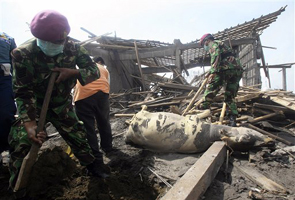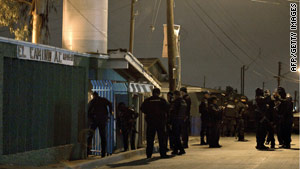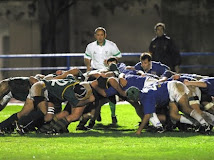Even as the Obama administration moved to s
top training and equipping Pakistani Army units that have killed civilians in the offensive against the Taliban, the United States said Friday that it planned increased aid for Pakistan's military over the next five years. Secretary of State Hillary Rodham Clinton made the announcement in Washington alongside the Pakistani foreign minister, Shah Mehmood Qureshi, as leaders from both nations convened for a series of meetings. The new aid package, totaling $2 billion, is meant to replace one that expired Oct. 1. It would complement $7.5 billion in aid that the United States has already pledged to Pakistan for civilian projects, some have which have been directed toward helping the nation recover from the damaging floods. In announcing the aid, Mrs. Clinton did not discuss the administration's moves to stop financing certain elements in the Pakistani Army that have killed unarmed prisoners and civilians. On Thursday, senior administration and Congressional officials said that the Obama administration planned to cut off funds to those units. The step appeared to be an unusual rebuke to a wartime ally, illustrating the growing tensions with a country that is seen as a pivotal partner, and sometimes impediment, in a campaign to root out Al Qaeda and other militant groups.
The White House had not told Pakistan of the decision to cut off those units' funds, according to officials from both countries. It has privately briefed a few senior members of Congress, but it has not given them details about which Pakistani units will be affected by the suspension. One senior administration official said there was "a lot of concern about not embarrassing" the Pakistani military, especially during a week in which officials are here for the third "Strategic Dialogue" in a year. Thursday's decision to cut to cut off those units' funds came just as the two countries were trying to get beyond a sharp exchange after NATO helicopter gunships killed three Pakistani paramilitary troops, and Pakistan retaliated by shutting down a critical allied supply route into Afghanistan. President Obama met Wednesday in Washington with Pakistan's army chief, Gen. Ashfaq Parvez Kayani, and other senior Pakistani officials before leaving on a campaign trip to the West Coast, but the White House provided only a vague description of their conversations. Most of the strategic dialogue is focused on coordination of a range of subjects, including counterterrorism, nuclear security, flood relief and trade.
The officials who described the decision said it would affect the Pakistani Army and special operations troops supported by the United States that have conducted offensives against Taliban fighters in the Swat Valley and South Waziristan in the past year, the officials said. But the process is not over: some additional Pakistani units may yet be denied American aid, officials say. The Leahy Amendment, a law that stretches back more than a decade, requires the United States to cut off aid to foreign militaries that are found to have committed gross violations of human rights. It has been applied in the past to Indonesia and Colombia, but never to a country of such strategic importance to the United States as Pakistan. "I told the White House that I have real concerns about the Pakistani military's actions, and I'm not going to close my eyes to it because of our national interests in Pakistan," Senator Patrick J. Leahy, the author of the amendment, said Wednesday from his home in Vermont. "If the law is going to have teeth, it has to be taken seriously. Pakistan's military leaders have made encouraging statements about addressing these issues, but this requires more than statements."
The United States spends about $2 billion a year on the Pakistani military, including money specifically designated for counterterrorism operations. A senior Pakistani official who has been involved in discussions about the issue said the United States had conveyed its concerns about reports of extrajudicial killings, which he said Pakistan was addressing. But he said Pakistan had not been notified that any army units had been refused training or equipment. The United States government "has not threatened us with withholding of assistance or training for any of our military units on these grounds," the official said. Much of the administration's review has been overseen by Adm. Mike Mullen, the chairman of the Joint Chiefs of Staff, who has also been one of the administration's direct contacts with General Kayani. Admiral Mullen has spoken to senior lawmakers, including Senator Leahy and Senator John Kerry of Massachusetts, the chairman of the Foreign Relations Committee, and assured them that the law would be followed, a senior military said.
Once strictures are in place, the government has inspections to make sure that the sanctioned units do not receive American training or equipment. Admiral Mullen is acutely aware that the United States is in a difficult position on this issue, senior military officers said. He is pushing Pakistan to enter forbidding territory to take on Al Qaeda and the Pakistani Taliban -- a point that Mr. Obama reinforced in his meeting with General Kayani -- even as the administration is punishing Pakistani troops for human rights abuses. Part of the difference is a stark cultural gulf between Pakistani military units, especially the lightly trained Frontier Corps, and American troops. American officials have long suspected that some Pakistani units have killed unarmed detainees and their civilian sympathizers in revenge for attacks on military and police outposts. The absence of a reliable court system to handle detainees also encourages battlefield justice, American officials say. General Kayani, who is considered more influential than any civilian official in the weak Pakistani government, has begun to act on the American warnings, senior American officials said. He recently ordered an inquiry into an Internet video that shows men in Pakistani military uniforms executing six young men in civilian clothes.
General Kayani said in a statement at the time that violations of army rules against extrajudicial killings "will not be tolerated." The Pakistani military has been accused of hundreds of extrajudicial killings. The Human Rights Commission of Pakistan, a nongovernmental organization, said in June that 282 had been committed in the Swat region in the previous year. But a senior State Department official said the Internet video seized the attention of senior officials at the White House and the State Department, and intensified discussions about how to deal with the issue. Some officials said the video might have also forced General Kayani to act. "As General Kayani has said repeatedly in public and in private, professional standards and enforcement of those standards are the hallmark of a modern and successful military," Tommy Vietor, a White House spokesman, said Thursday in a statement. "These issues are part of our conversations with all militaries around the world with whom we work." The White House's most recent quarterly report to Congress on developments in the region cited continuing reports of gross violations of human rights in Pakistan. "There was some evidence that the Pakistani military has made initial steps to stop those abuses," the report said. "However, despite U.S. engagement on the issue, reports of ongoing abuses continue to surface."
Under pressure from the United States, the Pakistani Army in 2009 carried out an offensive in Swat in the northwest, and a year later in South Waziristan in the mountainous tribal regions along the border with Afghanistan. In each case, the army has struggled to conduct counterinsurgency missions that maintain public support while singling out insurgents and their sympathizers in the population. The killings in Swat appear to include Taliban prisoners. The army has also created makeshift prisons where some 3,000 suspects are believed to be held, whom the army is reluctant to turn over to unreliable civilian courts.



























































































